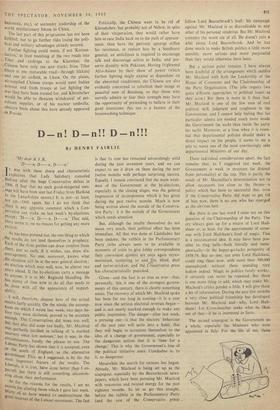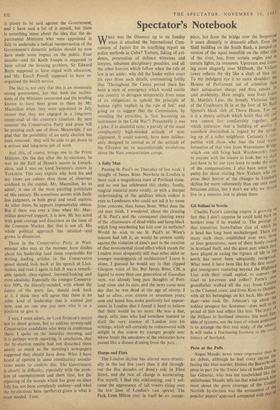D n! D--n!! D n!!!
By HENRY FAIRLIE
'My dear A. J. B..
'D—n. D—n. D--n.'
TT was with these sharp and characteristic lexpletives that Lady Salisbury consoled Balfour after the huge Conservative defeat in .4 1906. (I fear that no such good-tempered mes- 4-, sage will have been sent last Friday from Hatfield to the Lanarkshire moors.) It is not—at least, not yet-1906 again, but I do not think that there is any apposite comment which a Con- servative can make on last week's by-elections, except: `13-0. D—n. D—n.' That said, there seems to me no reason for getting any more
excited.
As has been pointed out, the one thing to which the results do not lend themselves is prophecy. Each of the three parties can draw comfort from them, just as each, if it wishes, can draw dis- couragement. No one, moreover, knows what the situation will be at the next general election: an election which may well, now, be almost two Years ahead. If the by-elections carry a message to anyone, it is to Mr. Reginald Maudling. He has plenty of time now to do all that needs to
be done with all the appearance of respect- ability.
I will, therefore, dispose here of the actual results fairly quickly. On the whole, the assump- tions on which I wrote last week, two days be- fore they were declared, proved to be accurate enough. The Conservatives did none too well, but they also did none too badly. Mr. Macleod was perfectly justified in talking of `a marked recovery since last summer,' but it was, in the circumstances hardly the phrase to use. The Labour Party has shown that it is accepted, even in the south of England, as the alternative government. This, as I suggested, is by far the most important feature of the results. The Liberals, it is true, have done better than I ex- pected; but there is still something unconvin- cing about their performance.
As for the reasons for the results, I see no reason for altering those which I gave last week. Many of us have tended to underestimate the great reserves of the Labour movement. The fact is that its vote has remained astonishingly solid during the past seventeen years, and we can expect to see it draw on them during the next twelve months with perhaps surprising success. Equally, I remain convinced that the main weak- ness of the Government at the by-elections, especially in the closing stages, was the general impression of incompetence which it has given during the past twelve months. Much is now being written about the morale of the Conserva- tive Party: it is the morale of the Government which needs attention.
But, although the results themselves do not mean very much, their political effect has been immediate. All that was done at Llandudno has been undone; the rabbits in the Parliamentary Party (who always seem to be available in moments of crisis to give lobby correspondents their convenient quotes) are once again myxo- matosised, scuttering to and fro, blind, deaf .0: and terror-stricken; and the Conservative press has characteristically panicked.
Given—and the fact is as true as ever—that, personally, this is one of the strongest govern- ments of this century, there-is clearly something amiss. The recovery of which Mr. Macleod spoke has been far too long in coming—it is a year now since the serious electoral reverses began— and is not nearly marked enough to make any public impression. The danger—after last week, a pressing one—is that the electors' behaviour of the past year will settle into a habit, that they will begin to accustom themselves to the idea of a change of government, especially to the dangerous notion that it is 'time for a change.' This is why the Government's loss of the political initiative since Llandudno is, to it, so dangerous.
Meanwhile the search for excuses has begun. Already, Mr. Macleod is being set up as the scapegoat, especially by the Beaverbrook news- papers, which have been pursuing Mr. Macleod with venomous and twisted energy for the past eighteen months. So let us get this straight, before the rabbits in the Parliamentary Party (and the rest of the Conservative press)
follow Lord Beaverbrook's lead: his campaign against Mr. Macleod is as discreditable as any other of his personal vendettas. But Mr. Macleod commits the worst sin of all. He doesn't care -a whit about Lord Beaverbrook. And he has done much to make British politics a little more sensible, more serious and more purposeful than they would otherwise have been.
But a serious point remains. I have always been doubtful of the arrangement which saddles Mr. Macleod with both the Leadership of the House of Commons and the Chairmanship of the Party Organisation. (The jobs require two quite different approaches to political issues as they arise.) But there is more to it than that. Mr. Macleod is one of the few men of real political skill, judgment and toughness in the Government, and I cannot help feeling that his particular talents are needed much more inside the Government (as such) than inside the party (as such). Moreover, at a time when it is essen- tial that departmental policies should make a direct impact on the people, it seems to me a pity to waste one of the most convincingly able departmental Ministers of our day.
These individual considerations apart, the fact remains that, as I suggested last week, the Government is weak in structure (as distinct from personality) at the top. This is partly the result of Mr. Macmillan's determination not to allow successors too close to the throne—a policy which has been so successful that, even if the Conservative Party did want to get rid of him now, there is no one who has emerged as the obvious heir.
But there is one last word I must say on this question of the Chairmanship of the Party. The cry always goes up for a return of Lord Hail- sham or, at least, for the appointment of some- one with Lord Hailsham's kind of magic. This is a misconceived idea. It may have been pos- sible to ring 'bells—both literally and meta- phorically—in the happy-go-lucky prosperity of 1958-59. But no one, not even Lord Hailsham; could ring them now, with more than 500,000 unemployed, without them sounding very hollow indeed. Magic in politics rarely works: it certainly can never be repeated. But there is one more thing to add, which may make Mr. Macleod's critics, ponder a little. I will give them a bit of information. During the past few months a very close political friendship has developed between Mr. Macleod and—why, Lord Hail- sham ! Let Cross-bencher make what he likes out of that—if he is interested in facts.
The second scapegoat is the Government as a whole, especially the Ministers who were appointed in July. For the life of me, there, is plenty to be said against the Government, and I have said a lot of it myself, but there is something inane about the idea that the de- partmental Ministers who were appointed in July to undertake a radical reconstruction of the Government's domestic policies should by now have made some impact on the public. Four months—and Sir Keith Joseph is supposed to have solved the housing problem, Sir Edward Boyle supposed to have coped with education, and Mr. Enoch Powell supposed to have re- organised the health service.
The fact is, not only that this is an immensely strong government, but that both the inclina- tions of the Ministers concerned and the briefing known to have been given to them by Mr. Macmillan when they were appointed in July ensure that they are engaged in a long-term reappraisal of the country's situation. By next summer the Conservative Party and press will be praising each one of them. Meanwhile, I am glad that the possibility of an early election has been removed: they will be able to get down to a serious and long-term job of work.
And this, of course, brings one to the Prime Minister. On the day after the by-elections, he was on the Earl of Home's moors in Lanark- shire, and I was on Lord Swinton's moors in Yorkshire. This may explain why both his and my views are calmer than those of observers confined to the capital. Mr. Macmillan, let us admit, is one of the most puzzling politicians of this century. He sometimes moves with fault- less judgment, in both great and small matters. At other times, he appears impenetrably obtuse. But if there was ever a time when Mr. Mac- millan deserved support, it is now. He has acted with great courage and directness on the issue of the Common Market. But that is not all His whole political approach has steadied—and grown in dimension.
Those in the Conservative Party at West- minster who may at the moment have doubts about his leadership (and those responsible for writing leading articles in the Conservative press) should look back at his speech at Llan- dudno, and read it again in full. It was a remark- able speech, clear-sighted, forward-looking and even idealistic. Especially the younger Conserva- tive MPs, the liberally-minded, with whom the future of the party lies, should look back at it. I think they will agree that there is no other kind of leadership that is wanted just now, and no one else just now who is in a position to give it.
I was, I must admit, on Lord Swinton's moors not to shoot grouse, but to address seventy-odd Conservative candidates who were in conference there. I spoke on the Saturday morning, and it is perhaps worth reporting, in conclusion, that the by-election results had not disturbed them nearly as much as the morning's newspapers suggested they should have done. What I have heard of opinion in some constituency associa- tions seems to confirm this. The Government is clearly in difficulty, especially with the prob- lem of unemployment and short time, but the repairing of the morale which has gone on since July has not been completely undone—and what the by-elections have (perforce) given is what is most needed. Time.







































 Previous page
Previous page